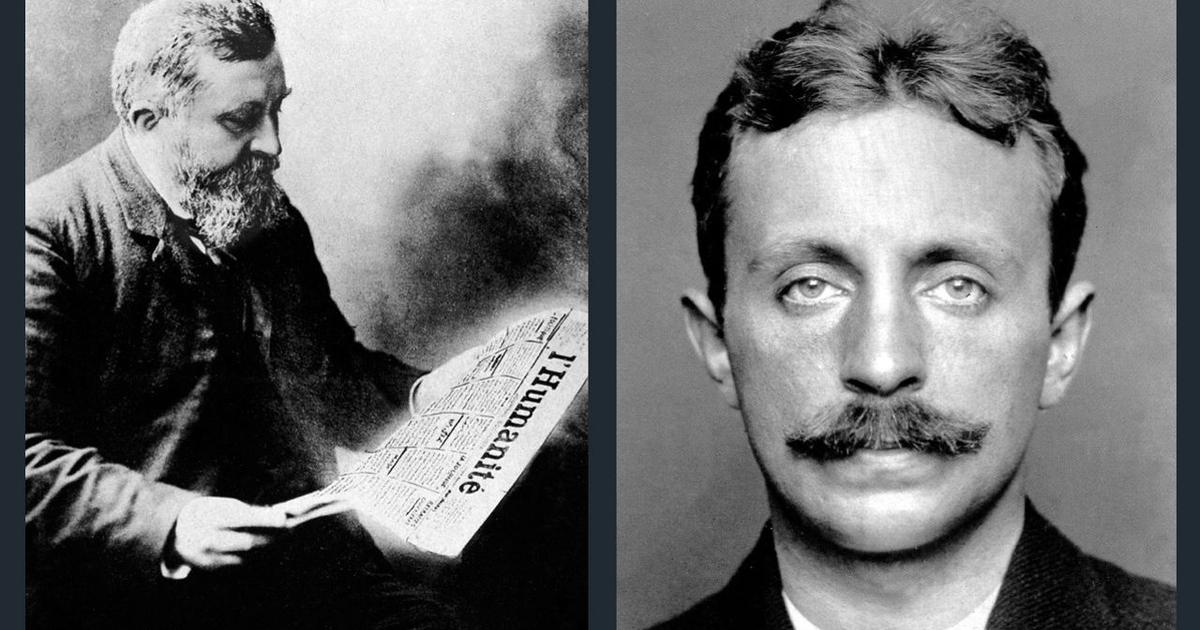55 months of preventive detention. Arrested on July 31, 1914, Raoul Villain spent the entire period of the First World War in prison. René Viviani, then President of the Council, declared: “The assassin has been arrested, he will be punished”. On March 24, 1919, at the opening of the trial, when Raoul Villain appeared before the Seine Assize Court, many things had changed: the Great War had wiped out many poilus, there were countless wounded and the time for the victory celebration. But, almost five years later, the man must explain his actions.
Murder at the Croissant Café
On the eve of the First World War Raoul Villain assassinated Jean Jaurès. He is firmly convinced that the founder of the SFIO and the newspaper
L'Humanité
“betrayed the homeland”. Indeed, the socialist leader is a convinced pacifist: he fights to avoid armed conflict. His last dinner took place at the
Le Croissant
café in the 2nd arrondissement of Paris, on July 31, 1914. It was there that, through a window hidden behind a curtain, Raoul Villain shot Jean Jaurès at point blank range. This act eliminates France's last hesitations to engage in the conflict.
On the first day of the trial Raoul Villain explains that first of all “he wanted to kill Guillaume”. In the court report,
Le Figaro
says: “Killing the Kaiser seems possible to him; he studies it and carries in his pocket a photograph of Guillaume, helmeted, disguised as Lohengrin, taken in Saint Mark's Square during his trip to Venice. He guesses that the emperor who has just landed in Venice is going to unleash war on the world tomorrow, and he wants to kill him.
Then he abandoned the idea, he added because “after all, he is perhaps the most artistic sovereign,” he said to one of his friends. The young man, as
Le Figaro
reveals , is interested in museums and sculptures. He obtained a diploma from the École du Louvre, the newspaper said.
On July 31, 1914, Jean Jaurès was assassinated at the restaurant “Le Croissant”. Rue des Archives/© Rue des Archives/PVDE
The idea of Jaurès' murder takes hold little by little. Faced with Germany's massive armament, and the pacifist ideas of certain left-wing figures, including Jean Jaurès, the young man made his decision to kill the founder of
L'Humanité
. “I was,” he said, “frightened of the danger that the country could run under the leadership of such people. So I had the idea of killing this man whom I believed to be harmful” reports
Le Figaro
in its edition of March 25, 1919.
Villain's trial or Jaurès' funeral?
On the second day of the hearing,
Le Figaro
asked: “Is it a living person that we judge, is it a dead person that we bury? Are we at the Villain affair or at the funeral of Jaurès? No one speaks the name of the accused anymore. Indeed, everything revolves around the debate on the patriotism of Jean Jaurès: the socialists do not agree on this point. The next day, the audience took a special turn: the discussions “sought to make the history of a world war lasting more than four years, and to establish what it would have been like if Jaurès had lived.” Then it is again, the praise of Jaurès which continues, underlines the newspaper. Men from all sides come to praise its merits. Faced with these discussions,
Le Figaro
became irritated: “This debate is becoming lamentable and farcical.” Where are we in front of a “military commission” or “in the chamber of deputies” the newspaper still quips. It was not until March 27 that we finally spoke about the accused Raoul Villain again: the defense witnesses evoked the intimate personality of the accused, his childhood deprived of a mother, a fragile and mysterious being. A deeply patriotic being who only thinks about two subjects according to a witness: “Alsace Lorraine and the three-year law”. All the detractors of this law are in his eyes adversaries of the homeland.
Villain acquitted
On the 5th day of the trial, it is time for indictments and pleadings. Joseph Paul-Boncour's argument, for the civil parties, concerns the role of the press which created an “atmosphere of hatred” around the socialist leader. The young Villain, who did not know Jaurès, “judged him wrongly based on controversial articles”. Paul-Boncour therefore calls for the conviction of Villain. Advocate General Béguin demands a “verdict with mitigating circumstances” and finally Alexandre Zévaès, Villain’s lawyer pleads for leniency.
On March 29, 1919, Villain was acquitted. “What were the motives of the jurors? Did they want to condemn a party's policy? Were they moved by the unprecedented long detention of the accused? Were they moved by the miserably sad life of the pitiful Villain? Who knows?" asks
Le Figaro
. In the aftermath of the war from which France emerged victorious, the jurors found Jaurès' assassin not guilty.
A “monstrous” verdict
Acquitted and released immediately, reactions were not long in coming. On April 4, in a protest addressed to the newspaper
L'Humanité
, Anatole France declared that "this monstrous verdict outlaws all workers." A demonstration is organized by various socialist groups from the Seine and the Union des syndicats.
Le Figaro
concluded the day after this demonstration: “A total of three hours of parade. Calm day, minor incidents.”
Free, Raoul Villain will wander from town to town, regularly changing his identity. We find him once in Paris where he is convicted of currency trafficking. Finally, he ended his life in Ibiza and was - ironically - assassinated by a detachment of Republican soldiers, two months after the outbreak of the Spanish Civil War.
» ALSO SEE - “Jaurès led his fight at the risk of his life”

